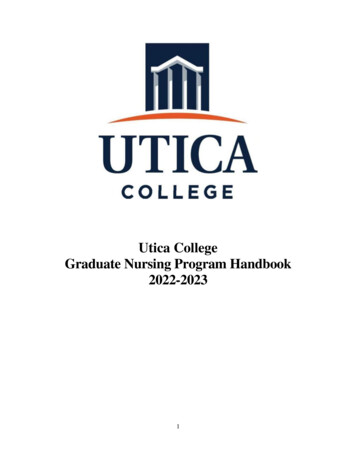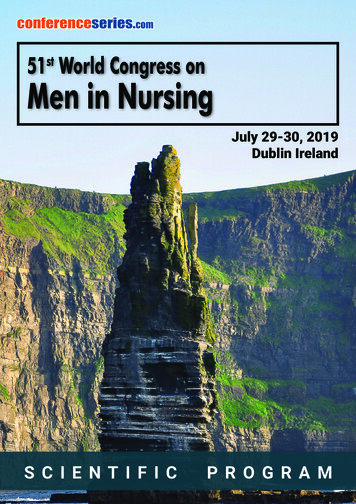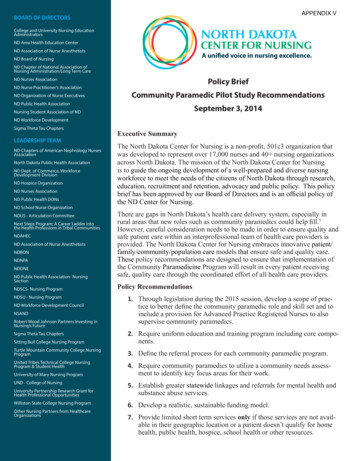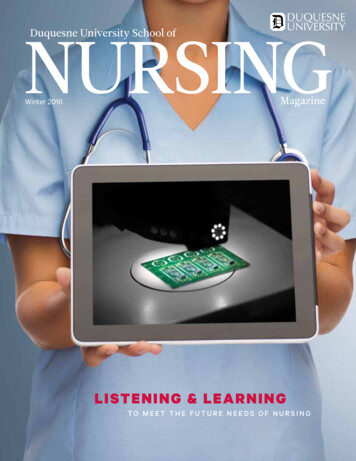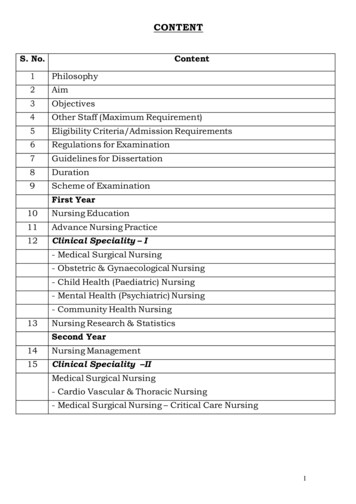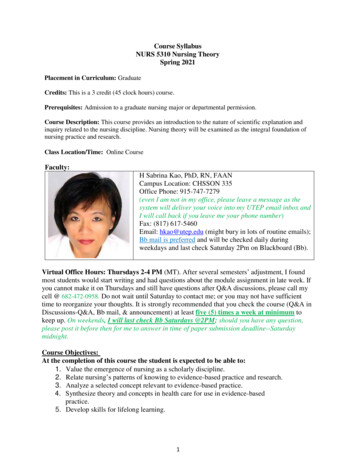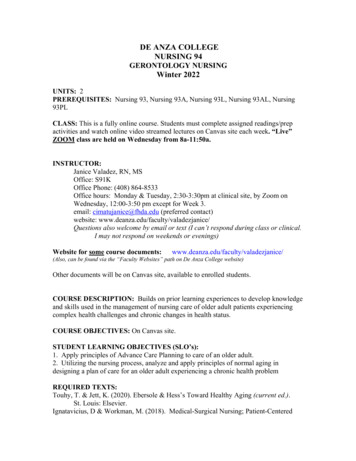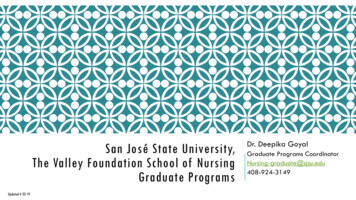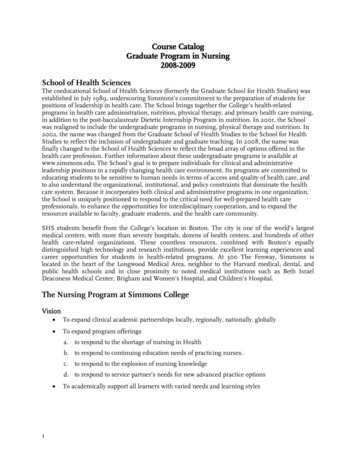
Transcription
Course CatalogGraduate Program in Nursing2008-2009School of Health SciencesThe coeducational School of Health Sciences (formerly the Graduate School for Health Studies) wasestablished in July 1989, underscoring Simmons’s commitment to the preparation of students forpositions of leadership in health care. The School brings together the College’s health-relatedprograms in health care administration, nutrition, physical therapy, and primary health care nursing,in addition to the post-baccalaureate Dietetic Internship Program in nutrition. In 2001, the Schoolwas realigned to include the undergraduate programs in nursing, physical therapy and nutrition. In2002, the name was changed from the Graduate School of Health Studies to the School for HealthStudies to reflect the inclusion of undergraduate and graduate teaching. In 2008, the name wasfinally changed to the School of Health Sciences to reflect the broad array of options offered in thehealth care profession. Further information about these undergraduate programs is available atwww.simmons.edu. The School’s goal is to prepare individuals for clinical and administrativeleadership positions in a rapidly changing health care environment. Its programs are committed toeducating students to be sensitive to human needs in terms of access and quality of health care, andto also understand the organizational, institutional, and policy constraints that dominate the healthcare system. Because it incorporates both clinical and administrative programs in one organization,the School is uniquely positioned to respond to the critical need for well-prepared health careprofessionals, to enhance the opportunities for interdisciplinary cooperation, and to expand theresources available to faculty, graduate students, and the health care community.SHS students benefit from the College’s location in Boston. The city is one of the world’s largestmedical centers, with more than seventy hospitals, dozens of health centers, and hundreds of otherhealth care-related organizations. These countless resources, combined with Boston’s equallydistinguished high technology and research institutions, provide excellent learning experiences andcareer opportunities for students in health-related programs. At 300 The Fenway, Simmons islocated in the heart of the Longwood Medical Area, neighbor to the Harvard medical, dental, andpublic health schools and in close proximity to noted medical institutions such as Beth IsraelDeaconess Medical Center, Brigham and Women’s Hospital, and Children’s Hospital.The Nursing Program at Simmons CollegeVision To expand clinical academic partnerships locally, regionally, nationally, globally To expand program offeringsa. to respond to the shortage of nursing in Healthb. to respond to continuing education needs of practicing nurses.c.to respond to the explosion of nursing knowledged. to respond to service partner’s needs for new advanced practice options 1To academically support all learners with varied needs and learning styles
MissionThe Simmons College Nursing program supports the college mission by educating professionalnurses to assume roles in clinical practice, leadership, advocacy, scholarship and health care policy.Simmons College graduate nurses provide expert, compassionate care adhering to the highest ethicaland professional standards to client populations in all health care settings.ValuesSupport those of the college and include: Community Excellence Diversity (cultural competence) Scholarship Leadership Professionalism Compassionate care giving (humanism) Respect for others Evidence based practice Ethical practice Life-long learningPhilosophyThe faculty of the Nursing Program believes that a liberal education is essential for the developmentof professional nursing practice in a culturally, racially, and ethnically diverse community. Thequality of this practice is enhanced by and dependent on knowledge acquired from the liberal artsand sciences. The process as well as the content of the liberal education is fundamental to thedevelopment of critical thinking, decision-making and communication skills, as well as facilitatingthe individual student's development of an appreciation of the global society. The faculty believesthat learning is a unique lifelong process, moving from the simple to the more complex, andencompassing the domains which the learner integrates and utilizes in her/his growth as aprofessional nurse. Growth is evidenced as the learner gains an understanding of the profession ofnursing by acquiring knowledge in each of these domains.The Simmons College Nursing Faculty believes that professional nursing is practiced according tothe nursing metaparadigm, which includes beliefs about person, health, nursing, and environment.Each person is unique. Human beings are holistic in nature yet they have interacting biophysical,cognitive, social, spiritual, and developmental dimensions. Persons have their own perceptions,values, beliefs, and goals and have the ability to be self-directive, to adapt to change, to achieve theirpotential, and to ascribe personal meaning in their lives.2
Health may include states of wellness and illness. It has subjective and objective perspectives viewedfrom both the standpoint of the person and the health care provider. Wellness is a dynamic state ofintegrity whereby the person repatterns life toward optimal functioning.Health is recognized as a multidimensional and dynamic state and is defined as "the actualization ofinherent and acquired human potential, goal-directed behavior, competent self-care, and satisfyingrelationships with others while adjustments are made as needed to maintain structure, integrity andharmony with the environment." (Pender, 1987). The faculty believes that the professional nurseassists persons in identifying health needs, utilizing a holistic framework that recognizes theuniqueness and complexity of each person.Nursing is the diagnosis and treatment of human responses to actual or potential health problems.It involves an interaction between the person and nurse, within the context of environment, which isdesigned to promote, restore, and maintain health or support a peaceful death. The nurse usesknowledge from the natural and behavioral sciences, aesthetics including caring and empathy, andethics, which involve making moral choices. Nurses are ethically and legally accountable for theiractions. Environment includes biophysical, psychosocial, cultural, and spiritual dimensions thatinteract and influence health. Each person lives and interacts within an ever-changing environment.The environment can be modified to have a positive impact on health.The nurse independently utilizes the nursing process in the practice of professional nursing inaccordance with the standards of nursing practice and the ANA Code of Ethics. The nursecollaborates with persons, families and other health care professionals who are members of aninterdisciplinary team in assessing, planning, delivering, and evaluating health care.Theprofessional nurse functions as an advocate for person and focuses nursing practice on personwithin the context of family and community. The professional nurse is an active participant in thesocial and political processes that influence the health care delivery system. The nurse utilizescritical thinking and clinical judgment to analyze the person's needs, determine and implementappropriate therapeutic nursing interventions, and coordinate the activities of other health careproviders.Academic preparation for students must be consistent with the status and demands of the professionand health care delivery system in which nurses practice. To this end, the nursing program iscommitted to educate students both as generalists and as advanced practice nurses. Completion ofthe generalist component of the Nursing curriculum prepares students to practice as registerednurses who are able to incorporate professional nursing standards and research in their practice. Asregistered nurses, students collaborate as members of an interdisciplinary team, apply the conceptsof diversity and community service in their practice and use leadership skills to influence change inthe health care delivery system.The graduate program in Nursing at Simmons College is designed to prepare professional nurses forcareers in advanced clinical practice, academics and administrative leadership. Students in theprogram are mentored in a variety of clinical settings which range from primary health care todiverse specialty and acute settings. Knowledge acquired in their undergraduate education is appliedand synthesized to the advanced study of natural, behavioral and applied health sciences. Advancedpractice nursing in the graduate program means specialization, expansion and advancement in theprofessional role of the nurse practitioner, nurse scientist and nurse executive. Excellence inscholarship, clinical practice and service spans the curriculum. The essence of advanced practicenursing consists of the purposeful relationship created between the individual professional nurseand the patient, community or system at large. A multidisciplinary practitioner-mentoring model isapplied to guide students in the personalized development of clinical practice which both improvessystems of care and ultimately influences patient outcomes.3
The program emphasizes the development of excellent skills and acquisition of tools necessary tointegrate evidence, including safety quality care measures, into practice across the lifespan.The advanced practice nurse builds on an in-depth knowledge of the individual, family and thecommunity as a complex system and begins to expand interventions to include not only aresponse to immediate health care needs, but the promotion of health and prevention of illnessin these aggregates. Our students value the patient and the system from which these arise. Thequality of the therapeutic relationship between nurse and patient reflects collective competencies inclinical assessment, intervention and innovative strategies for care. The foundation of practiceexpands across diverse political, ethical and cultural populations, establishing opportunity to respondto the health care needs of our community.The Graduate Program in NursingProgram OverviewSimmons’ graduate nursing program offers students the opportunity to be active participants in anationally accredited educational program with an established history of academic and clinicalexcellence. The program provides students with specialized education in primary health care nursingfocusing on scholarship, practice, and research as adult health, gerontological health, occupationalhealth, women’s health, parent-child health, and/or family nurse practitioners. Graduates areprepared for leadership positions, research initiatives, and doctoral study. Several off-site programsprepare graduates for the roles in executive nursing.The educational program combines classroom and clinical experiences that are responsive to studentneeds and interests as well as to program goals. Students participate actively in the process ofteaching and learning. Their varied experiences and knowledge are integrated into the educationalprocess through the faculty’s use of interactive teaching, web-enhanced learning, seminars, tutorials,and the case-study method. Students gain clinical experience in major health care settings within themetropolitan Boston community. Students are precepted by certified advanced practice nurses andmentored by nursing faculty who are themselves certified advanced practice nurses and active inpractice.An interdisciplinary certificate of advanced graduate study in health professions education preparesgraduates for positions as university faculty and other teaching roles. This program providesstudents with an opportunity to continue doctoral studies in our Ph.D. in Health ProfessionsEducation, offered through the College of Arts and Sciences.The Doctor of Nursing Practice (DNP) program develops nursing leaders who will improve healthcare outcomes in clinical practice, nursing leadership/management and nursing education.Graduates will have the clinical, organizational, research and leadership skills to meet the changingdemands of the present and future health care system. Three tracks are offered in the program:Clinical Leadership, Educational Leadership, and Nursing Leadership/Management. Each track hasthree foci: core/support courses in health policy, leadership, and technology; a practice component;and a practice-based research component. Students enroll in the DNP core courses, specialty coursesfor each track, and complete a Capstone Project. Credit hours vary, depending on specialty trackrequirements. Students with two years of experience may apply for advanced standing in a bridgeprogram.4
ObjectivesThe primary goal of the curriculum is to provide students with specialized education in primaryhealth care nursing and nursing administration as well as the foundation necessary for scholarlyinquiry, clinical excellence, research, and leadership as well as the preparation essential for doctoralstudy. The program is located within the School of Health Sciences, which provides a uniqueopportunity to work and study within an interdisciplinary environment, modeling the essentialteamwork of the health care setting.Through systematic inquiry, graduate students obtain the expanded clinical and theoreticalknowledge essential for critical analysis and synthesis of client data. Classes for both full and parttime students in the graduate nursing sequence are offered over a one- to-two day period during theweek. The full-time academic program for adult and parent-child primary care concentrations is twoyears with one summer semester. Students selecting part-time study complete the program in threeor four calendar years. Sample curricula for these options are found later in this catalog. The familyhealth concentration can be completed in three years of full-time study or four to five years of parttime study. Starting in 2011 the nurse practitioner program will prepare all graduates as family nursepractitioners in two years of full time study.All concentrations share a core of courses in scholarly inquiry, research, and clinical practice that arecritical to functioning in the advanced practice role.Graduate Program Outcomes: Primary Health Care NursingAt the completion of the program, graduates will: Synthesize theoretical, scientific and contemporary clinical knowledge for the assessmentand management of both health and illness states. Critique, evaluate, synthesize and utilize theoretical, scientific and clinical knowledge asapplied to the assessment and management of primary and acute health and illness states. Demonstrate a personal, collegial and collaborative approach in the delivery of primary healthcare nursing to patients in a variety of health care settings. Demonstrate a personal, collegial and collaborative approach as an advanced practice nursewhile emphasizing health promotion, disease prevention and identification of environmentalfactors that impact health status across the lifespan. Provide cultural competent primary health care nursing. Develop and understanding and appreciation of human diversity as an advanced practiceprofessional to assure the delivery of appropriate and individualized health care across thecurriculum. Demonstrate effective written and verbal communication skills essential to theimplementation of the nurse practitioner role in the delivery of primary health care. Demonstrate sound critical thinking and clinical decision making reflected in effectivewritten and verbal communication skills utilized by the advanced practice nurse in a complexdelivery system. Demonstrate a commitment to the implementation, preservation, and evolution of the nursepractitioner role. Demonstrate personal qualities and professional behaviors which are assertive and engage inadvanced practice activities that advocate for on-going change and leadership within nursingand in the health care system. Utilize critical thinking and build collaborative, interdisciplinary relationships to provideoptimal care to patients.5
Apply critical thinking skills within a multidisciplinary approach to care which fostersstrategies and assembles multifaceted resources to empower patients, families andcommunities to attain and maintain maximal functional wellness.Demonstrate accountability for nursing judgments and interventions utilized in the deliveryof primary health care to diverse client systems.Demonstrate nursing judgments and interventions which provide culturally sensitive care ondiverse populations and subcultures which influence human behavior and differences withinethnic, gender, racial and age systems.Execute leadership skills and management processes with the interdisciplinary health careteam to maximize the health outcomes for patients, communities, and systems.Design and participate in the implementation of primary health care in diverse health caresystems and assume a leadership role in the managing of patients, communities and largersystems which are responsive to the needs of the public.Initiate change through negotiation with health care professionals in the health care deliverysystems on behalf of clients.Professional Standards that guide the nurse practitioner programs include: The American Nurses Association Standards of Clinical Practice The American Nurses Association Nursing Code of Ethics The American Nurses Association Social Policy Statement The American Association of Colleges of Nursing Essentials of Master's Education forAdvanced Practice Nursing The National Organization of Nurse Practitioner Faculties Curriculum Guidelines andProgram Standards for Nurse Practitioner Education Nurse Practitioner Primary Care Competencies in Specialty Areas Quality and Safety Education in NursingProgram of Study: Primary Health Care NursingThe Graduate Program in Primary Health Care Nursing offers three core programs of study: 6Adult, with specializations in: Adult Health Gerontologic Health Occupational Health Women’s HealthParent-Child, with specializations in: Children/Adolescents with Special Health Care Needs Pediatric Health School HealthFamily Primary Care
Degree OptionsMaster’s Degree Program for Nurses with a B.S.N. or B.A. /B.S. in a Related FieldThis program is designed for registered nurses who have a baccalaureate degree in nursing or arelated field who wish to obtain a graduate degree in nursing within a nurse practitioner specialtyconcentration. This program can be completed either full time in two years or part time in eitherthree to four years. The Simmons College graduate program is one of the oldest nurse practitionerprograms in the country.Master’s Degree Program for Diploma or Associate Degree NursesThe RN-M.S. in Nursing Program is a unique curriculum designed for diploma and associate degreeregistered nurses who wish to obtain a graduate degree in nursing within a nurse practitionerspecialty concentration. The program is individually designed and paced to allow the student tocomplete the program in three to four years once the prerequisite courses are met. There is no timelimit on undergraduate courses accepted for transfer. These features, among many others, positionthe program among the best in the country. Specifics will vary depending upon experience, previouseducation, and selection of part-time or full-time study. See the curriculum for more information.Master’s Degree Program for Non-Nurses with a B.A. /B.S.The Direct Entry Program in Advanced Practice Nursing is designed to prepare individuals withoutnursing backgrounds for the advanced practice nursing role. The program is a three-year, full-timeprogram. Direct Entry students will be expected to maintain a working relationship with a nursementor during the program. This individual will be selected by the student during the first nursingcourse and will guide the student through the socialization process. Students in the Direct Entryprogram are eligible to take the RN nursing licensure examination at the end of the second fall term.They must pass the exam before beginning the graduate primary care clinical sequence, though theywill participate in campus laboratory experiences beginning in the summer of the first year of theprogram.Master’s Degree Program for Practicing Nurse PractitionersThis program is designed for nurses currently practicing as nurse practitioners who wish to expandtheir nursing skills through graduate education. Critical-thinking skills and a strong knowledge basein primary care are required. Applicants may specialize in any of the previously describedconcentrations. Candidates are encouraged to meet with the Course Coordinator to discuss theirindividual experience and goals for the program. Two courses can be challenged: NUR 404, Normaland Abnormal Human Physiology, and NUR 422, Clinical Pharmacology. Primary care courses maybe waived at the discretion of the Department Chair. Candidates must present evidence of licensurein the advanced practice role of nurse practitioner and documentation of current certification as anurse practitioner. If the primary care sequence is waived, the program of study consists of eighteento twenty-five credits. The program can be completed either full time or part time. Upon successfulcompletion, the student will be awarded a Master of Science degree in Nursing.Dual-Degree Program in Occupational HealthSimmons College, in cooperation with the Harvard School of Public Health Educational ResearchCenter for Occupational Health and Safety, funded by the National Institute for Occupational Safetyand Health, established a dual-degree option. This two-year, full-time program offers a Master ofScience in Primary Health Care Nursing from Simmons College and a Master of Science inOccupational/ Environmental Health from the Harvard School of Public Health. The program7
prepares students in the fields of epidemiology and occupational health research, leadership, andpolicy development. Core courses include the graduate nursing core courses, the Adult/OccupationalHealth Primary Care core courses, and courses at the Harvard School of Public Health.Students admitted to the dual-degree program enroll in half-time study at both Simmons College andthe Harvard School of Public Health for two academic years plus one summer session at SimmonsCollege. The program is approximately 77 semester hours. Applicants to the dual-degree programmust apply to both institutions and meet admission requirements for both institutions. Applicationsfor the Harvard School of Public Health can be obtained from the school’s admissions office at 677Huntington Avenue, Boston, MA 02115.Dual-Degree Program in Maternal-Child HealthSimmons College and the Harvard School of Public Health offer a two-year, full-time, dual-degreeoption offering a Master of Science in Primary Health Care Nursing from Simmons College and aMaster of Science in Society, Human Development, and Health from the Harvard School of PublicHealth. The dual-degree program allows preparation as a parent-child nurse practitioner, andadditionally prepares the graduate to deliver care to aggregate populations of women and/or childrenat a public health level and to develop health programs in the community. Graduates of the programare eligible to sit for the appropriate certification exam administered by the professional nursingorganization.Students admitted to the dual-degree program enroll in half-time study at both Simmons College andthe Harvard School of Public Health for two academic years plus one summer session at SimmonsCollege. The program is eighty semester hours. Applicants to the dual-degree program must apply toboth institutions and meet admission requirements for both institutions. Applications for theHarvard School of Public Health can be obtained from the School’s admissions office at 677Huntington Avenue, Boston, MA 02115.Post-Master’s Nurse Practitioner Certificate of Advanced Graduate Study (C.A.G.S.) forM.S.N.s who wish to become Nurse PractitionersThis program was developed for individuals who have acquired their Master’s degree in nursing andwish to become nurse practitioners. The program of study allows students to focus on the essentialcontent and role development of the nurse practitioner. The number of credits will depend on theconcentration area selected. Two courses can be challenged: NUR 404, Normal and AbnormalHuman Physiology; and NUR 422, Clinical Pharmacology. Courses in the research sequence will notbe required for those students who have completed a master’s thesis that meets the Program’scriteria. The elective courses are optional.Post-Master’s Nurse Practitioner Certificate of Advanced Graduate Studies (C.A.G.S.) inOncology for Master’s prepared Adult Nurse PractitionersThe Post Master’s Oncology Nurse (AOCNP) C.A.G.S. option is designed to prepare theadvanced practice oncology nurse for a challenging role in providing innovative care tooncology patients across the health care continuum. The program blends the educationphilosophies of the clinical nurse specialist and the oncology nurse practitioner. This fusionof nursing philosophy prepares the graduate to expertly care for individuals and theirfamilies across the lifespan and the illness trajectory.8
A comprehensive and culturally sensitive philosophy of patient care is emphasized so that faculty andstudents integrate biophysical, psychological, cognitive and spiritual needs of cancer patients andtheir families. The theoretical coursework and clinical preceptorships focus on prevention, earlydetection, active treatment, palliation and survivorship across the illness continuum.Clinical experience involves working with oncology nurse practitioners in general and specialtysettings. The students are exposed to innovations in treatment modalities, various communitylinkages and dynamic, multifaceted role of the advanced practice oncology nurse. This 19 creditcertificate option allows students to prepare to meet the challenges of a rapidly changing andcomplex healthcare environment which influences clinical decision-making and the application offiscally responsible care.Post-Master’s Nurse Practitioner Certificate of Advanced Graduate Study (C.A.G.S.) inFamily Health for M.S.-prepared Adult or Pediatric Nurse PractitionersA unique program of study allows the masters-prepared practicing nurse practitioner to complete acourse of part-time study to qualify for the American Nurses Association family nurse practitionerexam. For certified adult nurse practitioners, the curriculum includes the primary health care of theparent-child health sequence, the family health courses, and clinical practice. For certified pediatricnurse practitioners, the curriculum includes the primary health care of the adult sequence, the familyhealth courses, and clinical practice.Requirements for Program Completion for All Nursing Candidates*Prerequisite for the Research Sequence (SHS 410: Research Methods)For all Master’s Candidates:StatisticsAn undergraduate-level statistics course must be completed before taking Research Methods (SHS410). The course should include the following:1. Descriptive statistics: mean, median, mode, percent, distribution, normal curve, confidencelevels, variance, standard deviation2. Correlation: chi square, pearson r3. Inference: t-test, ANOVA4. Levels of significance5. Probability6. Parametric vs. non-parametric tests7. Hypothesis testing8. Types of errorIf an applicant’s course was taken more than ten years ago, the applicant should take the SimmonsCollege Self-study Assessment Test (available from the Nursing Department) to assess competency.If the assessment result is poor, the student should retake Statistics prior to taking SHS 410.9
Prerequisite for the Primary Care Clinical Sequence(NUR 560 or 580: Primary Health Care Nursing I)Health AssessmentA graduate health assessment course is required prior to entering Primary Health Care Nursing I(NUR 560 or NUR 580). This Health Assessment course can be completed after acceptance to eitherthe Direct Entry Nursing or regular B.S.N.-M.S. in Nursing program. Students in the adultconcentrations should take an adult assessment course. Students in the parent-child concentrationsshould take a pediatric assessment course. The course should include the following:1. Knowledge and skill in health history interviewing and in the use of the four basic physicalexamination modalitiesand2. Successful performance of a complete health history interview and physical examination.*Students must complete statistics and health assessment before beginning SHS 410 and NUR 560or NUR 580. However, the timing of when to take these prerequisite courses will depend on yourchosen curriculum. Please refer to the sample program curricula to determine if statistics and healthassessment should be completed before application or post-admission.10
B.S.N.-M.S. in Nursing Sample Curriculum for Adult and Parent Child ConcentrationTwo-Year Full-Time ScheduleYEAR 1FALLSHS 570Health Promotion: A Global Perspective . 2NUR 404Normal and Abnormal Human Physiology. 4SHS 410Research Methods .3Total credits. 9SPRINGSHS 450NUR 507NUR 580/560NUR 580A/560AThe Health Care System: Interdisciplinary Perspectives.3Scholarly Inquiry I . 2Advanced Health Assessment . 2Clinical Decision-making and Analysis I. 1Total credits.
Graduate Program in Nursing 2008-2009 School of Health Sciences The coeducational School of Health Sciences (formerly the Graduate School for Health Studies) was . The Simmons College Nursing Faculty believes that professional nursing is practiced according to the nursing metaparadigm, which includes beliefs about person, health, nursing, and .
